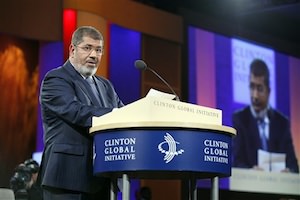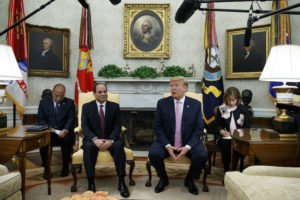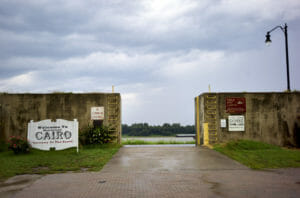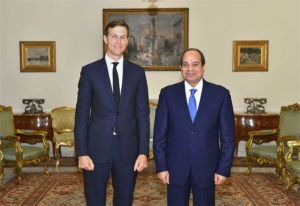Dispatches From Cairo: Morsi’s First 100 Days
The new president has kept only five of his 64 promises. From his campaign slogan of "Freedom, bread and justice," only bread has been delivered so far. Egyptians gather in Tahrir Square to express their frustration.
We asked Lauren Unger-Geoffroy, an international artist who lives in Cairo, to share her perspective of life in Egypt after the revolution. In this entry, she writes about protests in Tahrir Square over Egypt’s newly elected president.
CAIRO — I had an agreement with my friends Amr and Mohamed that they would take me to the protest in Tahrir Square on Friday but I would wear a hijab and glasses and not take pictures, and we would leave at the first sign of violence or mention by anyone of the word “spy.”
There were a few thousand people in the square when we got there after Friday noon prayers. Earlier, we had seen some small groups of marchers from my neighborhood heading there and chanting “down with the regime!” Another group later was chanting “bread, freedom and no justice! Morsi has us behind him.”
The air in Tahrir Square was bristling as men with beards and Muslim Brotherhood T-shirts glared at the single stage where chants against the group and its leader, Egyptian President Mohamed Morsi, were being led.
“Morsi, your 100 days are judged guilty!” the anti-Muslim Brotherhood protesters shouted. “Justice for our martyrs! Morsi you betrayed them! Clean out the judiciary! Out with the general prosecutor! Morsi’s boss is Muslim Brotherhood, not Egypt! Egypt for all, not only Islamists!”
In return, Muslim Brotherhood supporters chanted, “Allah is great! Long live the Islamist Revolution! Support your God and the Shariah! Morsi! Morsi! We stand behind you!”
Oddly, from both sides we heard some of the same refrains: “Freedom, bread and no justice! Out, Out, the Judicial Council! Say it loud, don’t be afraid, the general prosecutor must go! Justice for our martyrs or die like them!”
At the entrance to the square, we passed buses where some women were staying back while their men went inside to protest. “Are you MB [Muslim Brotherhood]?” I asked one woman, who replied yes.
She wanted the eviction of General Prosecutor Abdel Meguid Mahmoud, she said. The woman and the other demonstrators were not happy about the acquittal Wednesday of 24 suspects accused of ordering the “camel battle” of February 2011 when men on camels and horses attacked and killed nearly a dozen protesters in Tahrir Square who were calling for the ouster of Hosni Mubarak. The verdicts shocked and disappointed those who awaited a sentencing as testimony of the new government’s solidarity with the revolution. Morsi backers felt betrayed by the Supreme Judicial Council, an autonomous entity, and the opposition felt betrayed by Morsi.
But on Friday, the woman told me, she was at the square to support the president.
The women were staying outside with the buses because their husbands feared it might get violent in the square, she explained. “The opposition think we are here to take over the square but that is not true,” she insisted as she turned her attention to a newly arrived text on her cellphone. “Now there is some trouble. They are keeping our men out,” she read aloud as four or five young bearded guys came running back from the square to the buses.
Seeing the unwelcoming expressions on the men’s faces, my friend Mohamed pulled my arm and we walked away.
Friday’s demonstration was originally called by the revolution coalition to protest Morsi’s failure to fulfill his promises for his first 100 days in office as well as to criticize the Constituent Assembly, the panel that is drafting Egypt’s new constitution.
Morsi’s “100 days of judgment” have ended with only five of the president’s 64 promises accomplished. From his campaign slogan of “Freedom, bread and justice,” only bread has been provided so far.
Morsi had attempted to appease the people’s anger at the camel battle acquittal by removing Mahmoud from office and transferring him to the cushy post of ambassador to the Vatican, but the step was rejected by a committee of judges from the Mubarak era. Apparently, this group had the sole power over a decision that is outside of the president’s jurisdiction, according to the constitution that has yet to be rewritten to anyone’s satisfaction.
At Friday’s protest at the square, I went looking for PF, a French journalist I was helping. I saw him next to the Kentucky Fried Chicken with his Egyptian cameraman Hassan. We talked for a while as he explained what he wanted: a dramatic monologue. I hurriedly wrote on my notepad as I kept an eye on a nearby group of shouting anti-Muslim Brotherhood supporters who looked like they wanted to fight. Amr held onto my arm. The cameraman shot some footage of the crowd and then someone pushed someone.
“We will keep on defending the free revolution! Down with rule by Supreme Guide [Mohammed] Badie [leader of the Muslim Brotherhood],” one group yelled. Another responded, “Morsi! Morsi! We are behind you! Allah is great!”
PF wanted to move closer to the action. My friends said it wasn’t a good idea. We moved slightly inward, where it was not crowded but the people were agitated.
“They are taking our stage apart!” someone came up and told us excitedly. We heard yelling. There were no police officers around.
Two clean-shaven men approached us. “What are you doing here?” one asked aggressively. Amr told him we were OK, that we were visitors in Egypt and weren’t staying. His friend told him to leave us alone and let us show the world how Muslim Brotherhood supporters are stealing the revolution and think they own Tahrir Square. Soon, the pair moved on.
“That’s it. We have to go. This will get bad,” Mohamed said as he chain smoked.
“Just a minute, I am almost finished,” I insisted. PF and Hassan said they were going to go up to the balcony of Hassan’s friend and film PF giving his report.
Some of the crowd’s chants became shouted insults: “Fuck Morsi! We evicted the general prosecutor! Where were you to support us? Brotherhood get out! Morsi has us behind him! Who has you? It’s the people’s square, not the brotherhood’s square!”As we saw people gathering rocks, I showed PF the script I had written for him. “Is that OK?” I asked. PF had a few questions and soon after I answered them, we heard our cue to go.
“Egypt elected Morsi,” some protesters yelled. “He is our democratic president! If you want to hurt him you are traitors and spies!” There was that word — spies — that my friends and I had agreed to exit upon encountering. We nodded to one another. “Go safely and with peace,” we said to PF and Hassan, who headed off in a different direction from us. Mohamed and Amr sandwich-walked me as we skirted scuffles and lots of glares. But a stray rock still caught me on the elbow. “What the hell are you doing?” I shouted in Arabic at the guy I thought threw it. Amr tried to shush me, but I was too angry to be rational. “Who are you throwing at?” I yelled. I could have gotten a ballistic reaction, but a guy responded, “Sorry, sorry, we didn’t mean to hit you” as he and others picked up more rocks and my friends shuffled me out. We went past the scattered shouting matches in the street beyond the buses, one of which was now burning, and back to the metro.
It was dark by the time I left my protectors, and I decided to go get a coffee on the upscale other side of the tracks from my home. The privileged people in the cafe there were disgusted because they had learned that the Muslim Brotherhood had called on social media sites for its followers to show up to protest Friday, designating a time and a meeting spot at Tahrir Square. The demonstrators intended to go from there to the court, the social media posts said, to protest the camel battle acquittal and to demand the removal of Mahmoud. The people in the cafe were annoyed that now the Muslim Brotherhood was denying that any of its members were present in Tahrir Square! “It’s still the same, lies and lies” was the general sentiment in the cafe. One customer looking at his iPad said the anti-Muslim Brotherhood protesters were destroying the group’s Freedom and Justice Party headquarters in the city of Mahalla al-Kobra.
Even the patrons in this cafe, who could afford a pricey latte while the shoeless beggar children were chased away, said they felt the effects of the poor state of the economy.
A few blocks down, the social context shifted, and I covered my face and pulled my hijab lower over my forehead as I entered the filthy tunnel under the metro toward my home. The garbage-filled sewage water in the gutters on the sides made the air unbreathable as I walked closely behind a group of lump-shaped female silhouettes of assorted sizes in the near pitch blackness. We clumped together to avoid attracting the attention of any predatory males. The light was out again.
Coming out of the tunnel with relief, I loosened my face covering now that I was back among my neighbors, who normally greet me cheerily and do not care about Tahrir Square.
My phone rang. It was PF.
“Where are you?” I asked.
“At the hotel,” he said. “It went very well. It has all died down now. That was weird. They were all protesting the same things. Except the Islamist loyalty to the Muslim Brotherhood, but it really was hard to tell who they were throwing rocks at. You could only tell the MB members with the big beards.”
“Well, I hope it serves you,” I said, changing the subject, saturation achieved, job finished.
As I was on the phone with PF and about to enter my apartment building, the electricity of the whole sector blacked out with the usual loud clang. As happened most nights, voices raised in unison grumbled and complained in the dark. Cars honked. I sat down on the bench in front of my building next to the security guard and his friends, who had a small garbage fire going, and searched for my flashlight as I talked with PF.
He told me he had seen a campaign commercial for Mitt Romney that said President Obama’s friendship with the Arab world was responsible for the American ambassador’s death in Libya.
“That’s ugly,” I responded. “Anyway, I will be there in a few weeks to see what happens.”
In the morning I had an interview with an authority from the Egyptian Ministry of Electricity and Energy who had said he would tell me the truth about the fuel shortage if I didn’t use his name. I wanted to get online so I could get some background information to prepare for the meeting. I hoped the blackout wouldn’t last too long. The night before it had gone on for an hour and a half.
“Then I will see you in Paris,” I told PF.
“That would be great. We will have a drink,” he said.
I cringed uncomfortably at the mention of alcohol as I looked around guiltily at the people who don’t understand a word of French or English and at the three surrounding mosques.
I said “au revoir” to PF and then climbed five flights of stairs in the sooty dark to my apartment as the evening call to prayer began from all sides without speakers.
Your support matters…Independent journalism is under threat and overshadowed by heavily funded mainstream media.
You can help level the playing field. Become a member.
Your tax-deductible contribution keeps us digging beneath the headlines to give you thought-provoking, investigative reporting and analysis that unearths what's really happening- without compromise.
Give today to support our courageous, independent journalists.



You need to be a supporter to comment.
There are currently no responses to this article.
Be the first to respond.